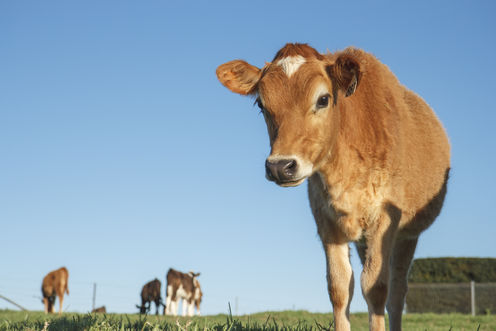Drs Catherine Douglas and Peter Rowlinson say they have shown in their study in Anthrozoos ("A Multidisciplinary Journal of The Interactions of People and Animals"!!) that by giving a cow a name and treating her as an individual farmers can increase their annual milk yield - by over 60 gallons.
I can't joke about 60+ extra gallons of milk per year. Okay, I can. I think my youngest kid drinks more than that in a week and I joke about it all of the time.

Anyway, this is in writing so it must be accurate - but I had to look at my calendar to see if the month was December. BMJ pranks people every December and they have gotten everyone else but we have never been fooled so I think they may be on some kind of vendetta, judging by the press releases I get sent. But, no, these folks are serious.
"Just as people respond better to the personal touch, cows also feel happier and more relaxed if they are given a bit more one-to-one attention," says Dr Douglas. "What our study shows is what many good, caring farmers have long since believed. By placing more importance on the individual, such as calling a cow by her name or interacting with the animal more as it grows up, we can not only improve the animal's welfare and her perception of humans, but also increase milk production."
There are too many logical flaws in that for me to tackle without being insulting so I won't. Plus, they got a farmer to agree. Dennis Gibb, who co-owns Eachwick Red House Farm outside Newcastle, with his brother Richard, says he believes treating every cow as an individual is "vitally important."
Says Dennis, "We love our cows here at Eachwick and every one of them has a name. Collectively we refer to them as 'our ladies' but we know every one of them and each one has her own personality."
Bonus Joke interlude
In a remote mining community, there are no women, so it's no secret that the men have engaged in odd relations with the sheep. A newcomer doesn't go for all that sneaking around and secrecy so he dresses up a sheep in a fine dress and parades her down the main street on their date. Everyone is aghast and whispers to each other when they see them.
"What?" he demands. "You are all doing the same thing, I am just treating the sheep like a lady."
"We got no problem with that," says one of the other men, "But that's the sheriff's girl you're with."
End joke interlude
Back to the study. How did they reach their conclusion? They questioned 516 UK dairy farmers about how they believed humans could affect the productivity of dairy cattle. 46% of the farmers said they called the cows by name and reported they had a 258 litre higher milk yield than those who did not.
48% agreed that positive human contact was more likely to produce cows with a good milking temperament and 9 percent said that a fear of humans resulted in a poor milking temperament. 90% of respondents thought cows had feelings and 78% thought cows were intelligent.
Basically they asked farmers how to get more milk and whatever half the farmers said was the conclusion.
Dr Douglas added: "Placing more importance on knowing the individual animals and calling them by name can – at no extra cost to the farmer – also significantly increase milk production."
This all looks like a lot of fun but the whole magazine is $60 so I can't recommend it. However, if your university carries it, I also suggest checking out:
The Effects of Human Age, Group Composition, and Behavior on the Likelihood of Being Injured by Attacking Pumas
and
Avian Consciousness in Don DeLillo's 'The Body Artist'
and maybe
Vampires Are Still Alive: Slovakian Students' Attitudes toward Bats
NOTES:
Citation: Bertenshaw, Catherine; Rowlinson, Peter, 'Exploring Stock Managers' Perceptions of the Human-Animal Relationship on Dairy Farms and an Association with Milk Production', Anthrozoos: A Multidisciplinary Journal of The Interactions of People&Animals, Volume 22, Number 1, Spring 2009 , pp. 59-69(11)




Comments